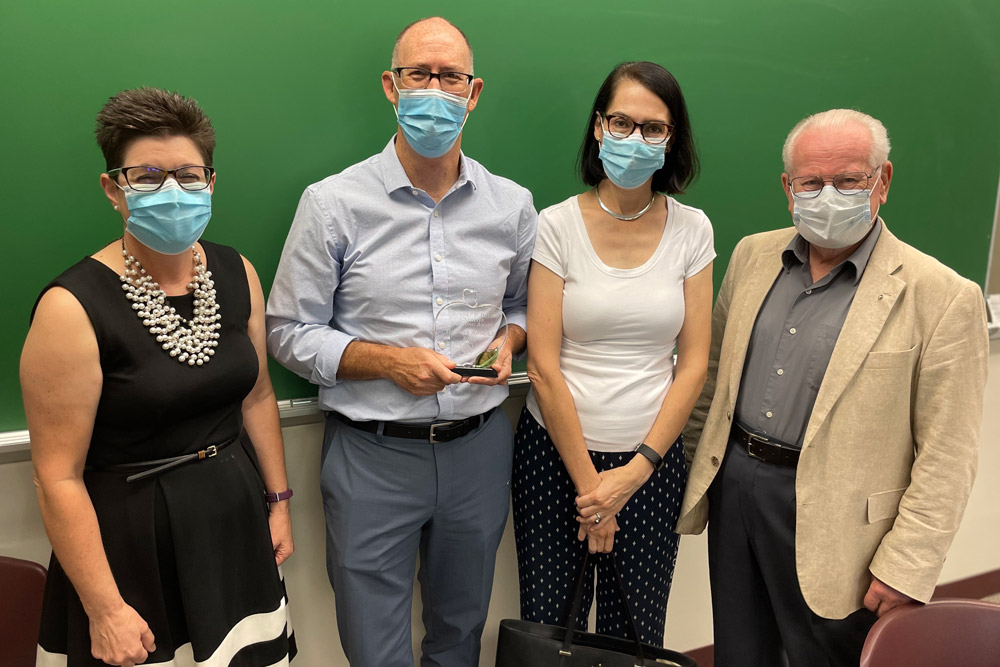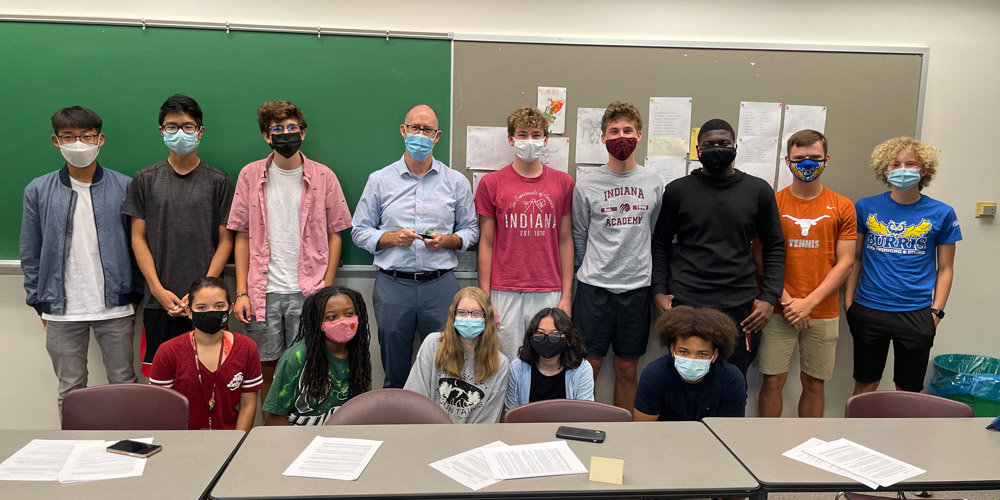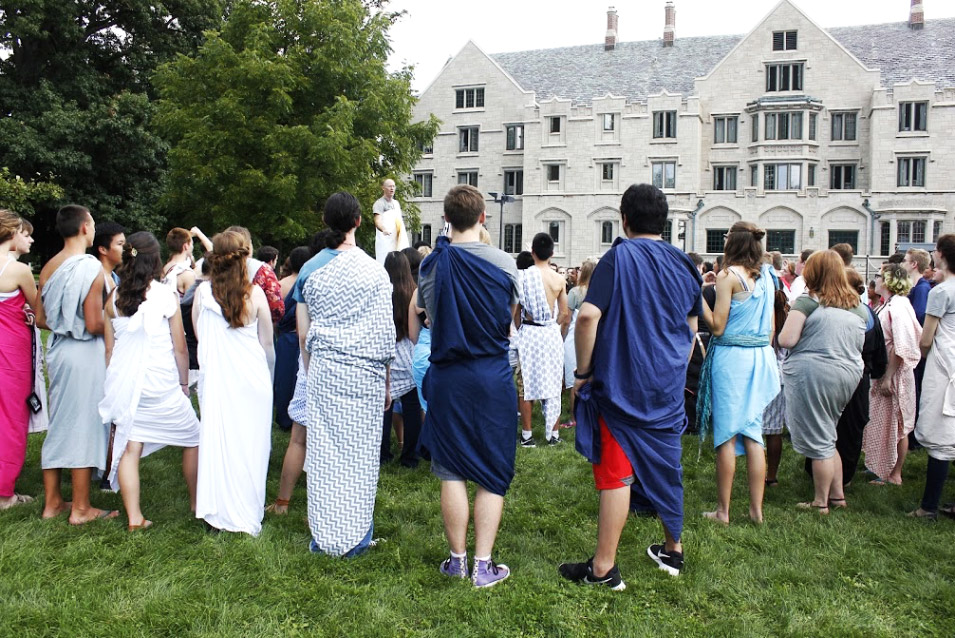April 2024 News
Dr. Tom Arnold, Candy Manship, and Sharon Johnson Celebrated for Combined 70 Years of Service
Friday, April 12, 2024
Congratulations to Dr. Tom Arnold, Associate Teaching Professor of History, Mrs. Candy Manship, Administrative Coordinator – Academic Affairs, and Sharon Johnson, Night Office Manager, for their respective length of service at Ball State and The Indiana Academy, totaling 70 years!
According to Dr. Olufowote, Director of Academic Affairs, “It is rare to see employees diligently serve day-in-and-out for the amount of time Tom and Candy have graced the Academy. Candy’s thirty years at the helm of state reporting and managing the affairs of all things academic at the Academy is incredible and a testament to the excellence and resilience of our community. Tom has been a gem for the Academy over the last two decades and is still operating with a youth-like enthusiasm and spirit for teaching, mentorship, and research. Those of us newer to the Academy stand on the shoulders of giants like Tom and Candy whom have clearly contributed towards earning our status as a premier institution of higher learning for the exceptional student.”
Paul Douglas, Director of Residential and Student Affairs, says, “Sharon has worked faithfully for the Academy for 20+ years and does an incredible job at a critical position. Few see her because she works from 11:30 p.m.-7:30 a.m. but many rely on the information she compiles and shares each day. Whether it is travel forms, overnight lists, rounds throughout the building, keeping our students and building safe, or being ready to respond to student needs and emergencies, Sharon handles all of it and allows all of us including our live-in staff, to rest well and be ready for the next day. Sharon is a wonderful example of dedication and care for this school we all love, and I am so grateful to have her as part of our team.”
Dr. Tom Arnold Receives Lilly Grant
Monday, January 29, 2024
Congratulations to Dr. Tom Arnold, Associate Teaching Professor of History, for receiving a $15,000 Lilly Grant! According to Dr. Arnold, the grant, “In Search of Sustainability: An Exploration and Comparison of Ancient and Modern Southeast Asia,” is an independent forty-day travel experience of discovery – and self-discovery – in Southeast Asia, focusing on four locations: ancient Angkor and Sukothai, and modern-day Bangkok and Singapore. The connecting, comparative question will be that of sustainability: how do we better build and maintain healthy, just, and resilient human communities?”
According to the Lilly Endowment Inc., The Teacher Creativity Fellowship Program (TCFP) is one of the Endowment’s longest standing programs, launched in 1987 to help Indiana public school teachers renew their commitment to teaching. Today, this program continues to support Indiana educators by providing resources for them to take time for meaningful renewal. The Endowment believes that through new experiences, exploration and reflection educators can generate renewed energy in their careers, innovative approaches to teaching and educational leadership, and thoughtful ways to encourage students’ creative thinking.
“Dr. Arnold has a passion for bringing the world into the Academy classroom and I can think of no better way to continue this practice than through this Lilly grant,” remarks Dr. Olufowote, Director of Academic Affairs. I’m so happy for Tom and excited for the students that will be enriched further through his research activity.”
Academy Faculty Recognized by Alumni’s Colleges
Monday, January 29, 2024
Congratulations to Dr. Tom Arnold, Associate Teaching Professor of History, and Professor Susie Cunningham, Associate Lecturer of Computer Science, on being recognized by the University of Chicago and Rochester Institute of Technology respectively! Both Dr. Arnold and Professor Cunnigham were identified by Academy alumni who attend each institution for the difference they each made in the lives of the nominating students. Dr. Arnold will visit U Chicago this February and Professor Cunningham will visit RIT this March, both on fully expense paid visits sponsored by each institution. “As an academic faculty, we are all so proud of the accomplishments of Susie and Tom,” remarks Dr. Olufowote, Director of Academic Affairs. He continues to say, “Our faculty work tirelessly on the behalf of students to prepare them for success at the next level and it is heartwarming to see them recognized for their excellence in the classroom and commitments to student success.”
Dr. Tom Arnold Selected as University of Chicago Outstanding Educator
Tuesday, June 27, 2023
Karisten Poole ’23 was recently accepted to the University of Chicago and recommended Dr. Tom Arnold to be selected as a University of Chicago Outstanding Educator.
According to Peter Wilson, Dean of College Admissions, “Each year, newly admitted students have the opportunity to select educators who go beyond everyday teaching and leave an impression that is carried over a lifetime. An Outstanding Educator thinks carefully about their instruction, shares an infectious love for learning, and cares for their students both inside and outside of the classroom. […] The University of Chicago is honored to recognize [Dr. Arnold’s] excellence as an educator who makes a positive impact every day.”
Dr. Arnold says, “Karisten was a fantastic student and very rewarding to teach while here at the Academy — I was very flattered that she took the time this summer to nominate me for this recognition from the University of Chicago.”
“We are all so proud of this additional accomplishment of Dr. Arnold’s,” says Dr. Joel Olufowote, Director of Academic Affairs. “Through project-based and immersive pedagogical techniques, Tom has routinely captured the imagination of his students at the Academy for nearly two decades. It is a tremendous honor for Karisten to nominate Tom for this award; we are a better institution because of her and Dr. Arnold.”
Congratulations to Dr. Arnold!
Dr. Tom Arnold Awarded Robert P. Bell Creative Teaching Award
Friday, September 17, 2021

Dr. Thomas Arnold received the Robert P. Bell Creative Teaching Award from The Community Foundation of Muncie and Delaware County, Inc. to recognize his creativity and innovation in the classroom.
Arnold, a history teacher at the Indiana Academy for Science, Mathematics and Humanities, was nominated by the former Director of Academic Affairs at the Indiana Academy, Dr. Jeff Smith, for his creativity in bringing art and art history together in his American History and American Government classes. Arnold is a recipient of multiple Robert P. Bell Education Grants from The Community Foundation that supported art bringing history to life for his students.
“For some of his students, the art experiences are the most meaningful lessons of the entire course,” wrote Smith in his nomination of Arnold. “Through his lessons, Dr. Arnold demonstrates to students that history is not just textbooks, statues, or other types of fading and decaying documents – history is a living thing.”
Arnold has been a teacher at the Indiana Academy since 2004. Today he serves as a classroom teacher as well as Chair of the Humanities Division. Through his leadership position, he has encouraged and supported his colleagues to apply for and utilize Bell Grants, resulting in more creative and innovative learning opportunities for the students in his school.
“I had the privilege of being able to observe one of Dr. Arnold’s projects during a classroom visit in 2019,” said Carly Acree-King, program officer at The Community Foundation. “I personally witnessed Dr. Arnold’s excitement for sketching Muncie history, and I watched it overflow and inspire his students who worked on their projects.”
Arnold was surprised with the award during a small ceremony at the Indiana Academy on Friday, September 17. The Indiana Academy for Science, Mathematics and Humanities received a $1,000 for use in Dr. Arnold’s classroom from The Community Foundation of Muncie and Delaware County to commemorate the award.

The Robert P. Bell Creative Teaching award was established to complement the Robert P. Bell Education Grants program and honor teachers who have gone above and beyond to use creativity and innovation to enhance learning by their students. The annual program rewards, recognizes, and encourages extraordinary educators who have applied for, received, and executed a Robert P. Bell Grant from The Community Foundation in their classroom. For more information about the Robert P. Bell Education Grants, please visit The Community Foundation’s website at cfmdin.org or contact Carly Acree-King, Program Officer, at cacreeking@cfmdin.org.
Academy Instructors Receive Bell Education Grants
Wednesday, November 20, 2019
The following Academy instructors received a Robert P. Bell Education grant from the Community Foundation of Muncie and Delaware County Inc.:
- Tom Arnold – $238.04 (Election of 1896 Posters)
- John Marsh – $450 (Build an Escape Room)
- Stephanie Nagelkirk – $356.29 (Harlem Renaissance Party)
- Evan Ward – $108 (Ancient & Medieval Medicine Science Fair)
Each of these instructors has been awarded a similar grant in the past, and we are proud of their continued efforts in securing funding for innovative projects for our students.
Two Indiana Academy Teachers Awarded Grants
Tuesday, November 27, 2018
The Community Foundation of Muncie and Delaware County, Inc. recently announced that two Indiana Academy teachers will receive a Robert P. Bell Education Grant. Funded projects are creative or innovative classroom projects designed to stimulate learning in students. Awards of up to $450 are available through the Bell Grants program, and eighteen local teachers will receive $4,863 for 13 projects.
Bell Grants for the second cycle of this school year that were awarded to the Indiana Academy:
- Thomas Arnold was awarded $112 to use sketching techniques to teach high school juniors to see the changes in the landscape of North America from different points in history to the present day. Students are instructed in collage and other art techniques to produce a final sketch that backdates their chosen present-day landscape to its circumstances before the arrival of Europeans, or even humans at all.
- Stephanie Nagelkirk was awarded $336 to provide high school juniors and seniors with an understanding of the Harlem Renaissance Period in African-American Literature and culture. Each student selects one historical figure who contributed to the period to learn about in detail. Students then plan an authentic formal party and assume the role of their researched character to share what they have learned with classmates.
Bell Grants are funded through the Robert P. Bell Teacher Grants Fund at The Community Foundation. This fund ensures that teachers have access to grants to help engage their students in meaningful ways for years to come. All Delaware County teachers are able to apply during any of the four grant cycles. Across the county, thousands of students benefit from Bell Education Grants each year.
Plato on Trial
Friday, September 30, 2016

“It has come to our attention that one Aristocles, popularly known as ‘Plato,’ has been teaching at the grove of Akademos in the sanctuary of Athena to the north of the city proper.”
Students at the Indiana Academy have once again been summoned to the turtle in the yard between Burris Laboratory Schools and Ball State University’s Elliot Hall to participate in the Academy’s annual event, The Trial of Plato.
Students grabbed their sheets, ropes, and other ancient accessories then headed down to the yard where they were to be considered citizens of the ancient democratic Athens. Students salvaged around their dorms, friend’s dorms, and various other places to find articles that could create an outfit fit for the Athenian world.
Everyone present became a member of the Assembly where they discussed and debated the political philosophy of Plato.
What’s the issue?
Plato would regularly lead discussions on all sorts of topics that were sought to have no sense of propriety or recognition of the limits of public discussion, especially with young men present at the Academy.
The people of Athens received details of these discussions with regard to the right governing of a city. The magistrates got possession of written transcripts purporting to be Plato’s accounts of his own teacher Socrates’ ideas on this topic; all citizens were then advised to review the public copies of these alleged teachings.
Socrates, though a veteran of the fight against the Persian foe at the battle of Delion and elsewhere, and thus a good patriot, came under suspicion of teaching against the democracy (and worse), was convicted by a jury of his peers, and then chose a draught of hemlock to escape that judgment.
A possibility of Socrates’ ideas not dying with him arose. The fear of these political ideas has caused a necessary meeting and trial of Plato in which the students are engaged.

